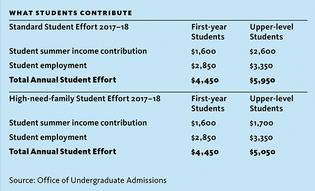 loading
loading
Light & VerityStudent group questions financial aid policyHow much should students contribute financially to their education?  Figures from the admissions office show how much students receiving financial aid are expected to contribute to their education. “High-need” families are those with annual household income under $65,000. View full imageFor years, Yale College has been trying to put out the word that its financial aid policies make a Yale education affordable to all—despite the hefty sticker price. “Families whose total gross income is less than $65,000 (with typical assets) are not expected to make a contribution towards their child’s Yale education,” the admissions website explains. But a group of undergraduates argues that there is a catch: a line item in every financial aid package called the “Student Effort.” Yale’s calculations assume students will cover some of their college expenses with jobs in the summer and during the academic year. For 2017–18, that estimated income ranged from $4,450 to $5,950. “Like all our peer schools,” says President Peter Salovey ’86PhD, “we ask students and their families to join us in contributing to their education through work on campus, so we can offer more financial aid to more young scholars.” Since 2012, a group called Students Unite Now has been lobbying the administration to eliminate the Student Effort. The need to work, they say, means that financial aid students have less time than their peers for leadership and extracurricular opportunities during the school year and fewer chances at unpaid internships and other activities in the summer. Allied with Yale’s employee unions, SUN has produced a report, op-eds, and student testimonials in its campaign. The Student Effort should be eliminated “because it creates divisions on campus along lines of race and class,” says Jacob Diaz ’20, a spokesman for SUN who was one of around two dozen students arrested in April during a sit-in protesting the Student Effort at the financial aid office. Diaz has a brother at Yale and another who recently graduated. “We are faced with the choice of sharing the burden with our family or missing out on participating in our education.” Yale’s financial aid calculations include expenses that are part of the overall cost of attendance, such as books, laundry, and travel to and from the campus. Most of the Student Effort goes toward those expenses, and not typically toward tuition or other expenses paid directly to the university. In some cases, parents or other family members pay those expenses themselves, so that students don’t have to work. In other cases, students take out Yale loans, or federal or private loans, to cover the contribution. Jeremiah Quinlan ’03, the dean of undergraduate admissions and financial aid, says that students on financial aid work an average of five hours per week, slightly more than the average of four hours per week for all Yale undergraduates. “If working five hours a week is not desirable,” says Yale College dean Marvin Chun, “you can take out a loan that can be easily paid off and not miss out on any opportunities.” Eliminating the Student Effort would mean increasing the $150 million annual financial aid budget by around $18 million, according to Chun. There is “minimal donor interest” in funding such an initiative, he says. Besides, he says, “We think work is a highly valuable experience for all students. There’s not a college graduate out there who thinks work is not a good use of a student’s time.” The university has taken several steps in recent years to reduce the burden. In 2016, Yale began awarding high-need first-years a $2,000 “college startup fund” to help them buy computers, winter coats, and other necessities. In each subsequent year, the students receive $600. Also, the Student Effort has been reduced for students from high-need families after their first years: from $5,950 to $5,050. And most recently, Yale created a summer award that gives financial aid students a $4,000 stipend so they can take an unpaid summer position in the United States. (A similar international summer award lets students pursue opportunities abroad.) Diaz calls such initiatives “steps in the right direction to ameliorate the problems facing low-income students at Yale.” Still, he adds, the Student Effort “will continue to force an artificial division on this campus until it is fully eliminated.” Student Effort expectations at Yale’s peer institutions are similar to Yale’s, ranging from $4,000 to $6,150.
The comment period has expired.
|
|